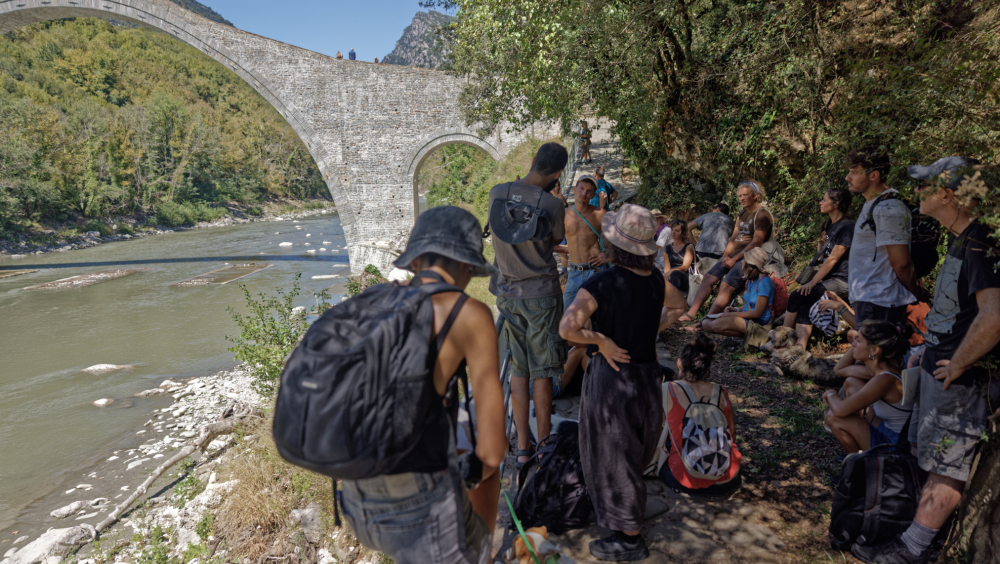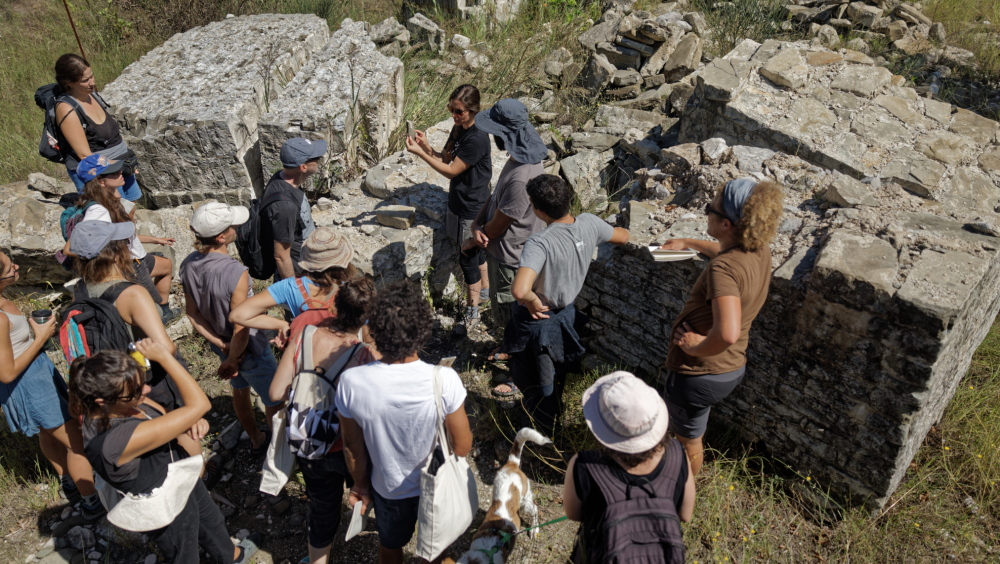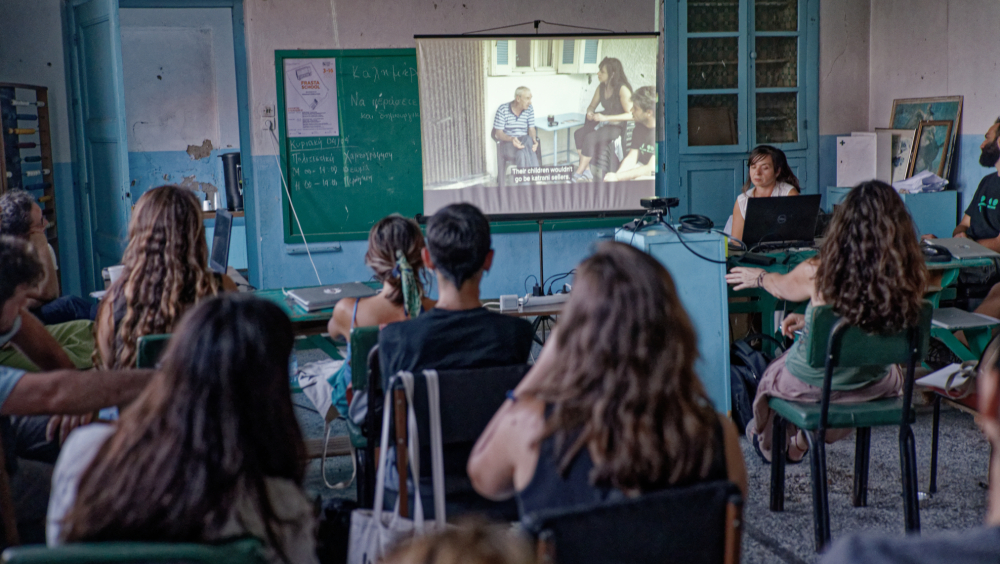Frasta School | Repurposing a Rural School Towards a Community Centre for sustainable building cultures
Nestled in the remote Tzoumerka mountains of Epirus, NW Greece, the Frasta School initiative is a transformative project aimed at revitalising a former primary school into a vibrant community hub focused on sustainable building practices, heritage preservation, and innovative learning. Through a participatory approach, the school is being restored using traditional and sustainable techniques that engage not only the local community but also a wider audience, in hands-on training and skill-building workshops.
The initiative advances the emergence of knowledge systems that have historically shaped the built environment and anthropogenic landscapes of Greece, presenting these systems as operational fields from which valuable lessons can be drawn for sustainable building cultures. By rethinking the built environment as a field for collective care of common resources, inclusivity, and literacy, the project empowers marginalised societies where vernacular knowledge is still celebrated, promoting environmental protection and climate responsibility. It inspires equity and solidarity among citizens who (re)claim a hands-on approach to the places they inhabit.
Frasta School fosters collaboration at local, regional, and international levels, facilitating cultural exchange and knowledge transmission among craftspeople, heritage professionals, students, and young professionals from the region and across Europe.
Boulouki, a grassroots collective of architects, engineers, and heritage professionals, has integrated the Frasta School project into several prominent European initiatives. These partnerships have broadened the project’s impact, facilitating transnational cooperation in heritage restoration while contributing to key European policies such as the European Green Deal, the New European Bauhaus, and the European Agenda for Culture.
By preserving and transmitting heritage building crafts, Frasta School tackles global challenges such as the climate crisis, while fostering local economic sustainability and social cohesion. Ultimately, it exemplifies how participatory, hands-on learning in heritage practices can support rural regeneration, promote sustainable development, and contribute to green reskilling and upskilling within local communities.
In the heart of the mountainous region of Tzoumerka, Epirus in Northwestern Greece, Boulouki is breathing new life into the formerly abandoned primary school of Frasta village. This ambitious initiative aims to transform the school, built in 1955 by the local community, into a vibrant co-creation hub reciprocating to the local community a space for collective learning and creative interaction.
The School, owned by the municipality of Central Tzoumerka, has been entrusted to Boulouki, a grassroots collective of architects, engineers, and heritage professionals. Boulouki’s mission is twofold: first, to restore the school using participatory methods and according to traditional, sustainable building practices; and second, to establish it as a living ecosystem where heritage, craftsmanship, and sustainable building are actively studied, shared and applied.
Boulouki also bridges a gap in heritage craft education by offering local apprenticeships and workshops that preserve essential skills and foster socioeconomic sustainability through professional training and job creation.
Boulouki’s presence in the region traces back to 2018, following the collapse of the historic Plaka Bridge in 2015. This severe event sparked national debate on heritage restoration, bringing local voices and specialists together. In response, Boulouki’s first initiative focused on restoring the cobblestone path leading to the bridge, a milestone that united local craftspeople, volunteers, heritage experts and architects from across the Balkans. This marked the beginning of a continued commitment to document, safeguard and restore the rich architectural heritage of Epirus and beyond.
The School in Frasta holds deep historical and emotional significance for the local community, as it once served as the primary school for many of Frasta’s residents and nearby villages. Built with the collective effort of locals, the school is a symbol of community pride and shared resources. After falling into disuse for decades, alongside the social and economic decline of the area, the school’s revitalisation has sparked joy, anticipation, and hope for a brighter future in this remote, marginalised region, which has suffered from population decline despite its rich natural and cultural heritage. The School is envisioned as a co-creation hub, fostering circularity, sustainable development and resilience not just in Epirus but across Greece and the Balkans.
The initiative features a rich diversity of stakeholders, fostering collaboration among public authorities, local communities- including people of various ages, background and gender balance-, craftspeople, academic and technical institutions, local businesses, and cultural bodies.
Since the beginning of this initiative, active participation and engagement of the locals have been vital. Two specific community-led actions took place at an early stage to strengthen collective memory and reinforce community cohesion: (a) Participatory Cultural Mapping and focused ethnographic field research, engaging local communities in valorising their heritage for cultural benefits and experiencing new aesthetics and qualities; and (b) the reactivation of a local custom of collective work towards a community project, specifically the cleaning of the old footpath that students once used to reach the school. Guided by the memories of local residents, this collective effort not only restored a physical connection to the school but also recorded stories and lived experiences, fostering a deeper sense of belonging.
Since 2022, the School’s participatory restoration has involved two professional apprenticeships, three hands-on workshops (engaging around 80 participants in construction), and community events with an attendance of over 500 people. During this time, the building has opened periodically for restoration and public programmes. Key milestones include the restoration of its timber roof in 2024 and the scheduled design of a lime-based plastering system in September-October 2025. These interventions balance respect for original materials and morphology of the building, with the necessary adaptations for safety and modern usability. Worth mentioning that public engagement has always been central, with open-site days, lectures, discussions & intergenerational events connecting residents, visitors, and professionals around Tzoumerka’s built heritage.
In 2025, the final restoration phase, which will be carried out through the "Keretsi" Project: Apprenticeship and Hands-on Workshop on Traditional Lime-Based Building Materials (keretsi meaning lime in the secret language of craftspeople), will mark the school's transition into a permanent, year-round community centre. This project will revive the lost heritage of aerial lime for a new generation of craftspeople and construction professionals. The dual training programme will include both a professional apprenticeship and a hands-on workshop on the use of lime-based mortars for masonry repointing and plastering, directly contributing to the restoration of the school. As part of this, Boulouki also plans to host a European Heritage Days event this year. The programme will feature a roundtable discussion with national and international experts, open to the public, exploring the theme of vernacular buildings in rural areas, with a focus on cultural identity and collective memory.
2024 was a milestone year for Boulouki as it was honoured with a Europa Nostra Award, a significant achievement which was celebrated at the Frasta School itself with a successful local ceremony. This event was held within the framework of the largest project to date that was taking place at the School at that moment, the participatory restoration of the timber roof through a dual educational programme, entitled “Tsiati”. This month-long project was enriched by a series of open events, culminating in a European Heritage Days celebration on September 27, 2024. The occasion marked the project’s conclusion with guided tours, presentations, discussions, and a community celebration, reinforcing the school’s renewed role as a cultural and educational hub.
Beyond these two major European institutions—Europa Nostra and EHD—Boulouki has been elevating the Frasta School initiative on a European level since its earliest efforts. Notably, activities under the Erasmus+ project H.E.R.O. (Heritage Restoration for Inclusion Opportunities) where Boulouki participates, has taken place at the Frasta School, bringing together international partners while also creating further opportunities for collaboration in other settings.
The Frasta School initiative has a significant European dimension, contributing to a shared European heritage narrative in various ways. It aligns with key European policies, including the European Green Deal, the New European Bauhaus, and the European Agenda for Culture. Additionally, it supports the European Framework for Action on Cultural Heritage, which prioritises participation, knowledge-sharing, and international collaboration. In this way, the Frasta School project exemplifies how traditional heritage skills can foster community development while addressing global challenges, such as the climate crisis.
The initiative encourages collaboration at local, regional, and international levels. Through partnerships with public authorities, local communities, and cultural institutions, it promotes cross-border cooperation in heritage restoration. Emphasising cultural diversity and accessibility, the project ensures deep community engagement, involving people of all backgrounds and maintaining gender balance across all activities. It also facilitates cultural exchange by bringing together craftspeople and experts from the Balkans and beyond.
Past activities at Frasta School have involved an international audience, both as participants in training programmes and as tutors, experts, or guest speakers. Boulouki has integrated the Frasta School project into several prominent European initiatives, such as the HERO Erasmus+ project and Creative Europe. These programmes strengthen the project's educational and cultural aspects, connecting it to a broader network of European heritage professionals and fostering transnational cooperation.
Finally, the initiative demonstrates how traditional heritage skills can drive sustainable community development and contribute to addressing national, European and global challenges.


